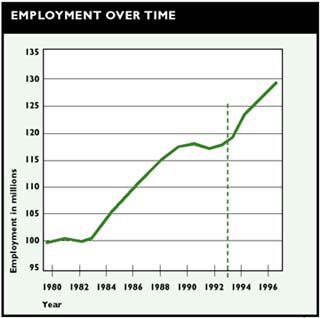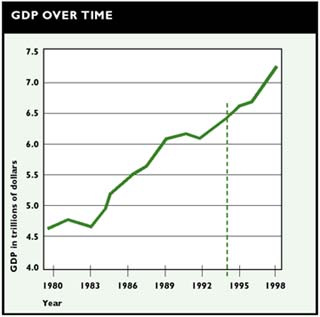- Budget & Spending
- The Presidency
- Economics
- Politics, Institutions, and Public Opinion
During the recent trial of President Clinton, many were worried that a Clinton departure would have adverse economic consequences. The evidence suggests otherwise. The American economy is quite resistant to changes in political administrations. The economy has been successful under Mr. Clinton, as it was under his two Republican predecessors. During the Bush administration, the economy experienced a mild recession. But it was already obtaining growth rates comparable to those seen during the last several years well before Mr. Clinton became president. Indeed, even with the recessions, annual growth in GDP, generally regarded as the way to gauge whether an economy is experiencing prosperity or recession, was slightly higher during the Reagan-Bush period than during the Clinton period.
The dotted line on the GDP graph below marks the point at which Bill Clinton took office. The trend toward economic prosperity, which began early in the Reagan administration, resumes during the last year of the Bush administration. The turnaround that began under Bush continued under Clinton. The rates of growth are similar. In fact, GDP growth during Bush’s final year exceeds the growth rates in four out of six of the Clinton years.
The employment picture is much the same. Job growth during the Reagan-Bush years was substantial, as it has been under Mr. Clinton. The employment graph below reveals that the number of jobs in the economy grew during the Clinton term. But job growth began during the final year of Bush’s term. It did not wait for Clinton to take the reins.
 |
Finally, the stock market has risen consistently over the past two decades. The Dow-Jones Industrial Average approximately quadrupled over the Reagan-Bush period and went up more than two and a half times during the Clinton period. This growth occurred despite two recessions and the crash in 1987.
 |
The American economy is robust. It is the economic structure more than the actions of a particular administration that keeps an economy sound. Although it is possible for government to cause economic harm by imposing high taxes, burdensome regulation, or erratic monetary policy, no administration in the current climate is likely to take such action. Indeed, one can argue that Congress and the Board of Governors of the Federal Reserve System have held Mr. Clinton in check and that the steady growth should be attributed to them, not the president.
President Clinton has received too much credit for engineering an economic turnaround. The reality is that the economy was growing at the same pace well before he ever took the oath of office.







